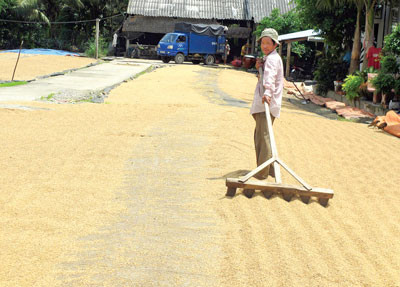Rice prices increase, farmers regret
Rice prices in the Mekong Delta provinces are at their highest level since the beginning of 2013 and Vietnam’s rice export price has surpassed Thailand’s by 10-20 USD/ton. However, currently in the country’s largest rice granary, the area of unharvested rice is very small; most rice farmers can only feel regretful because they have sold all their rice in the past 1-2 months.
High price... out of rice for sale!
 |
The story of rising prices and farmers having no rice to sell is common in Can Tho, An Giang, Vinh Long, Hau Giang, Tien Giang... Mr. Lam Van Met, residing in Dong Binh commune, Thoi Lai district (Can Tho), said: "For the past half month, every day traders have been going around the commune to buy all kinds of rice at very high prices. Dried IR 50404 rice is being bought at 5,800 - 5,900 VND/kg; high-quality rice 6,100 - 6,200 VND/kg; fragrant OM rice 4,900 - 7,000 VND/kg; fragrant Jasmine rice up to 8,000 VND/kg. The price is so high, but everyone sells rice as soon as it is harvested, and there are not many people storing rice."
According to Mr. Pham Van Quynh, Director of the Department of Agriculture and Rural Development of Can Tho, up to this point, farmers have planted more than 80,000 hectares of winter-spring rice, reaching more than 90% of the area and will be completed in the next few days. The situation of people "not having rice to sell while prices are high" has been repeated for many years. Dr. Le Van Banh, Director of the Mekong Delta Rice Institute, said: "During the peak harvest, most farmers sell at low prices right in the field to have money to cover their living expenses, pay off debt for materials and continue investing in the next crop. Now the prices are high, but the entire Mekong Delta currently has only about 100,000 hectares of rice in coastal areas that have not been harvested. This is a huge disadvantage! The difficulty now is that farmers do not have the ability and conditions to store rice for a long time, waiting for favorable prices to sell."
Early production according to industry chain
Currently, Vietnam's rice export price has surpassed Thailand's by 10 - 20 USD/ton. Raw rice prices in the Mekong Delta have also increased and are at their highest level since the beginning of the year. At Cai Rang and Thot Not rice markets (Can Tho), factories are purchasing at 7,600 - 7,900 VND/kg (depending on the type). However, the atmosphere at the rice markets is somewhat quiet, with very few traders' boats coming to trade. Some businesses have even stopped buying raw rice because there are no sellers and are focusing on delivering goods for export.
Mr. Pham Van Linh, Director of An Binh Food Enterprise (under Vinh Long Food Joint Stock Company located at Cai Rang rice market), said: “Currently, the supply of raw rice is still low, mainly traders sell to businesses serving the domestic market. Our warehouse has a capacity of 10,000 tons of rice but now there are only 3,000 tons left, however, this quantity has been sold to the “mother” company in Vinh Long, waiting for the day to export. At least 2-3 weeks from now, when farmers in the region start harvesting early winter-spring rice, the supply of raw rice will be better.”
Many people believe that the current high rice prices only benefit the most from rice exporting enterprises. Because these units have the conditions to purchase and temporarily store large quantities of rice when the price is low; at the same time, the government supports bank interest rates. Mr. Pham Van Quynh, Director of the Department of Agriculture and Rural Development of Can Tho, said: "To limit this situation, the agricultural sector recommends that people should not sell rice in bulk right at the peak harvest, but should invest in temporarily storing rice at home, waiting for favorable prices. The agricultural sector and farmers should promote the application of measures to minimize production costs; reduce intermediaries in the production chain; create conditions for enterprises to invest in developing warehouse systems and drying rice to meet the needs of the whole region."
Regarding this issue, Director of the Mekong Delta Rice Institute Le Van Banh said: “We must soon promote the formation of fields linked between enterprises and farmers producing according to the industry chain; divide profits fairly and reasonably. At the same time, encourage the establishment of new-style cooperatives and agricultural joint stock companies so that farmers can proactively produce and decide the prices of their products…”.
According to rural economy






